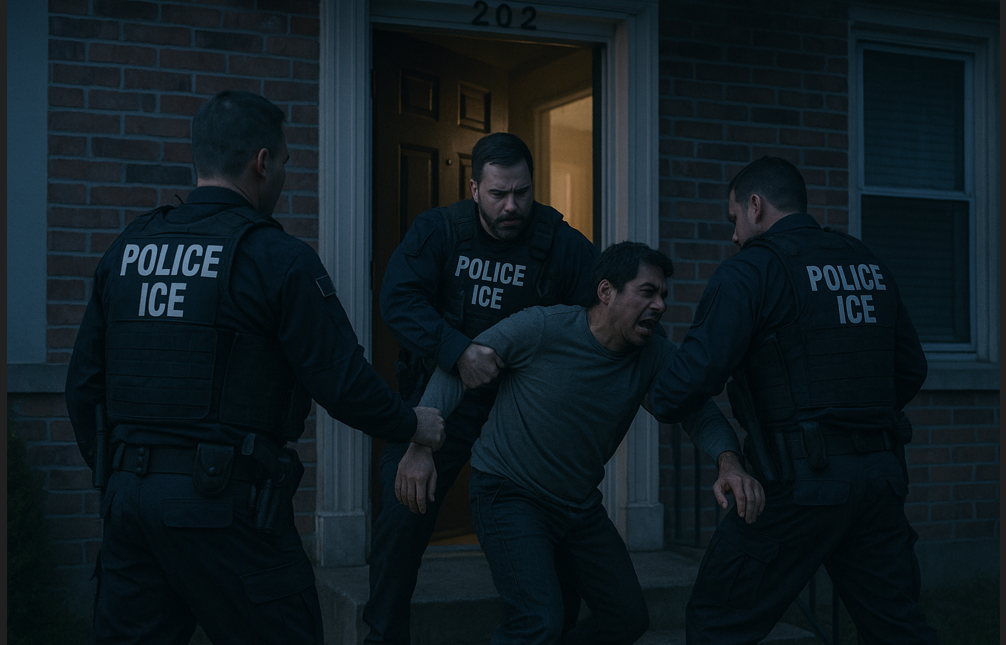U.S. Immigration and Customs Enforcement
Are ICE Agents and Marines Happy Deporting People?
It’s not a question anyone in Washington seems interested in asking. Are they happy? The agents. The guys in uniforms. The ones who yank people out of bed at 3 a.m., pull sobbing kids from their parents, shove families onto planes headed for countries they barely remember. Are they proud of it? Are they okay?

Some are. Let’s not kid ourselves. Every system has its diehards—the ones who believe cruelty equals strength. The ones who smirk while carrying out policies that make the rest of us flinch. You give them a badge, a gun, a green light, and they’ll carry out orders all day long without a second thought. These are the people who thrive in the machinery of state power, especially when that machinery is pointed at the vulnerable.
But most? They’re not thriving. They're not proud. They're not okay.
That’s not a guess. That’s documented. In 2019, DHS—which includes ICE—ranked second to last in overall morale among large federal agencies, according to the Office of Personnel Management's Federal Employee Viewpoint Survey. ICE itself routinely ranks among the worst places to work in government. Not because of the workload, not because the hours are bad—because the mission grinds people down.
You can’t spend your days detaining asylum seekers, raiding homes, and escorting families to the edge of ruin without feeling it. You can’t listen to a child scream for their mother and call it "just paperwork." Some agents try. Some succeed. Most go numb. They drink. They compartmentalize. They hang on for the pension.
And still, they show up.
Because the benefits are decent. Because the pay is steady. Because a federal job is a lifeline, even when the work eats at your soul. Because quitting in protest is hard when your mortgage is due and your spouse needs health insurance.
So, no—they’re not happy. But that’s not really the point.
The real question is this:
At what point do they stop following illegal orders?
Because that line matters. Not every executive order is lawful. Not every directive is constitutional. Not every policy is just. And under U.S. law—whether you're wearing fatigues or a DHS polo—you are required to disobey unlawful orders. It’s not just your right. It’s your obligation.
That’s what we taught at Nuremberg: “I was just following orders” isn’t a defense. We held people accountable for carrying out evil, even when it came from the top.
But here’s where it gets tricky: what if the orders feel legal? What if they’re wrapped in the flag, approved by lawyers, signed by the President, and rolled out as policy?
That’s how the worst things in history happen. Not with an explosion, but with paperwork. Not in defiance of law, but through its slow corruption. Step by step. Language gets softened. People become “illegals.” Camps become “detention facilities.” Raids become “interior enforcement.”
And when a political leader stands at a podium and promises mass deportations, military involvement, detention camps—and the cheering gets louder—you start to wonder how many will follow orders, and how many will say no.
Because the next time around, it won’t be a surprise. The infrastructure is in place. The legal justifications have already been drafted. The agencies have been tested. ICE expanded massively under Trump. CBP too. And when they were told to separate children from parents? They did it. Some objected. A few walked away. But most stayed.
Most followed orders.
And here’s the part that’s hardest to admit: even the miserable ones kept doing it.
Even the ones who hated it. Who knew it was wrong. Who went home angry or sick or ashamed. They still clocked in. Still processed the paperwork. Still loaded the plane.
So, are they happy? No.

But do they deserve sympathy?
That depends. Because unhappiness isn’t a moral pass. Plenty of people have been unhappy doing despicable things. Plenty of them cried at night and still did it again the next day. Feeling bad doesn’t make you right. It just means you still know the difference—and chose not to act on it.
The legal standard is clear: you don’t follow unlawful orders. The moral standard is clearer: you don’t take part in cruelty, no matter how it’s dressed up. If you can’t do the job without breaking people, then the job is broken—and staying in it makes you part of the breakage.
We keep being told these people are heroes, patriots, public servants doing a hard job no one else wants. But the job itself is the problem. It’s not that they’re reluctantly enforcing decent laws—it’s that they’re enthusiastically enforcing indecent ones. Or silently going along with them. And the silence is what keeps the system running.
So again:
Are they happy?
Most are miserable. But that doesn’t make them heroes. It makes them dangerous.
Because the ones who know better—and keep doing it—are the ones who let the worst parts of history happen, one file folder at a time.
And if that doesn’t make you uncomfortable, it damn well should.

